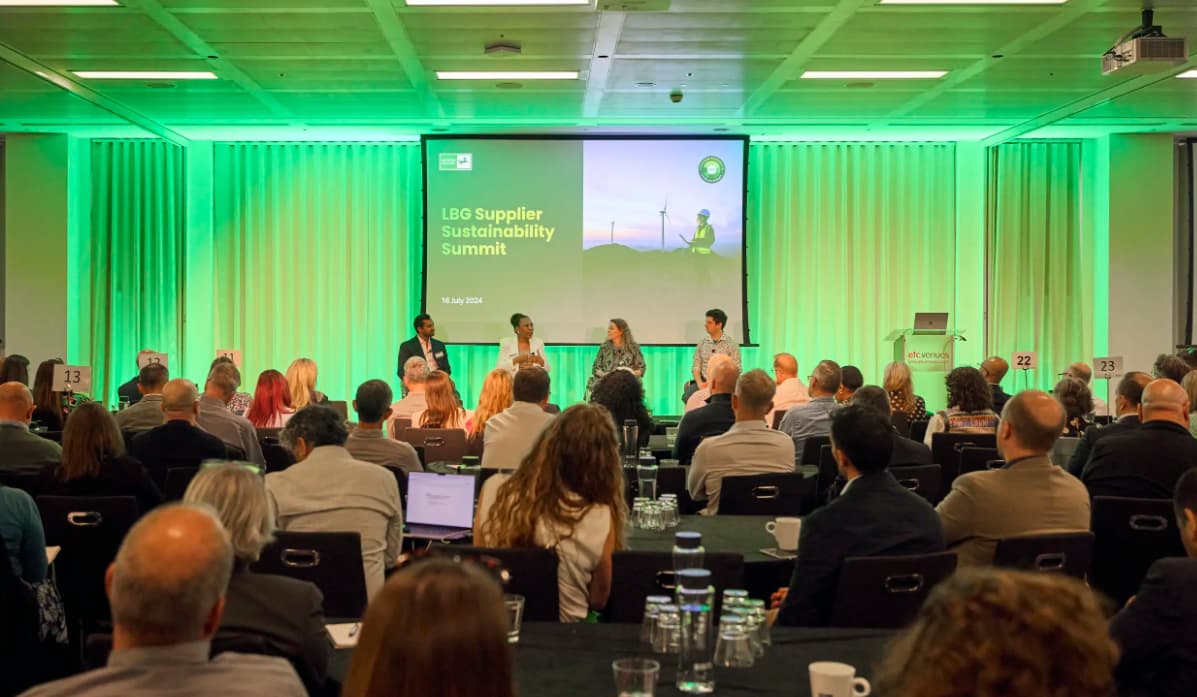Our purpose and strategy
Our purpose is Helping Britain Prosper.

We remain absolutely committed to managing our demand for supplier goods and services effectively – driving Emerald Standard Adoption and working with our suppliers collaboratively on our common journey to net zero.

Reaching a net zero economy by 2050 is essential. This is why we have an ambition to halve the carbon emissions generated by our supply chains, as well as the carbon footprints of our investments, by 2030 or sooner.
But for every organisation the journey to net zero is fraught with challenges. Our own supply chain emissions, for example, account for seven times that of our own direct operational emissions.
We want to drive positive change and, although we don’t have all the answers to such a complex problem, our ambition is to lead the way to a green economy. And it’s why in 2022 we set up The Emerald Standard.
Supply chain emissions are classed as ‘Scope 3’ by the Greenhouse Gas Protocol. In other words, these are third party emissions that occur by the provision of products and services through an organisation’s supply chain.
In our case, the suppliers we work with provide varying levels of products and services, supporting the Group’s activity and operations – from the purchase of goods and services across a range of different categories such as IT software and hardware, all the way through to consultancy services.
But this is not exclusive to Lloyds Banking Group, and a recent report from the Science Based Targets Initiatives (SBTi) found that the emissions in a company’s supply chain are, on average, 11 times higher than their direct – also known as Scope 1 and 2 – emissions.
We launched the Emerald Standard back in 2022. This is a set of 13 requirements that we ask our key suppliers to work towards, setting a clear environmental and social expectation across our supply chain to support our ambition to reduce Scope 3 carbon emissions.
The Emerald Standard is designed around four main areas: Calculating and disclosing suppliers’ carbon emissions via a public CDP response, having an ESG scorecard via EcoVadis (global provider of business sustainability ratings), setting net zero targets across all scopes and having those targets aligned with science.
Progress so far has been positive, with 36 out of 152 Suppliers in 2023 meeting all requirements. In addition, 137 Suppliers disclosed via CDP, 120 have an ESG score with EcoVadis, and 98 have set net zero targets with 96 of those aligned to science.
“In 2023, we spoke publicly for the first time about our ambition to cut the carbon emissions generated by our own supply chains by 50% by 2030, or sooner.”

As part of our journey, we analysed the forecasted emissions across our entire supply chain to get a better picture of where our Scope 3 emissions were generated so we could establish how best to tackle them.
We found that around 80% of our supply chain emissions were generated by a limited number of suppliers.
We’ve engaged directly with this group of 152 suppliers and, using the Emerald Standard framework, laid out clear expectations on the journey ahead. We never ask anything of our suppliers that we are not doing ourselves, and we leverage existing supplier’s disclosure via CDP and Ecovadis as much as possible to minimise the ask to our supply chain.
As mentioned earlier, given the complexity and urgency of the situation, the need for collaboration is vital. Given this we’ve previously held two virtual summits since launching the Emerald Standard, but with 2030 getting closer, and increased regulatory pressures, we knew we had to get our suppliers together face-to-face. This is why, on the 16th of July, we held our first ever in-person Supplier Sustainability Summit.
The summit allowed us to bring together our Emerald Standard suppliers, as well as additional strategic suppliers – 170 attendees across 140 unique organisations in total. Over the course of the day, ESG professionals from across our supply chain were able to talk directly to experts who offered advice on how to cut their carbon emissions and gain valuable insight from several keynotes and panels.
Indeed, we believe that through continued engagements through events such as these, our suppliers will get the support they need to face into the constant challenges that arise on the path to net zero.

"The LBG Supplier Sustainability Summit was informative, imaginative, focused and disciplined. Overall, a balanced agenda throughout the day with the opportunity to interact with a variety of vendors. Left feeling motivated to focus on areas we can update, improve and change to help us maintain the proactive mode we have towards sustainability. A key takeaway was how we can make small correctives to stay in line with LBG and the Emerald Standard" - Graeme Nicholas, Royce Comms
Like the businesses in our own supply chain, we have more to do to improve. Given the diverse nature of many of the goods and services we purchase, our suppliers operate in a number of different sectors. And the pace at which new technologies will become available within those sectors will vary. This is why it’s vital that we continue to support them so that, together, we can help Britain transition to a net zero economy.
Indeed, as one of the UK’s largest financial services groups, we remain absolutely committed to managing our demand for supplier goods and services effectively – driving Emerald Standard Adoption and working with our suppliers collaboratively on our common journey to net zero.

Chief Procurement Officer & Group COO Sustainability Sponsor
George Booth is the Chief Procurement Officer for Lloyds Banking Group. With 30-years’ business experience gained in the global hi-tech manufacturing and financial services industries, George specialises in sourcing and supply chain management.
He currently leads a team of over 300 colleagues based in the United Kingdom and manages an annual cash supplier expenditure of c.£5bn across more than three thousand active suppliers. With a passion for the Sourcing profession and the opportunities it provides, George is highly energised by his role and working with amazingly talented people.
As the GCOO* Sustainability Sponsor he also plays an active role in championing sustainability across GCOO, driving initiatives like the Emerald Standard, a key area of focus for GS&SM** which launched 2 years ago.
George is the Deputy Chair of the Lloyds Banking Group Scottish Executive Committee and a regional sponsor for the School of Social Entrepreneurs, a key community programme for the Group.

The transition to a green economy will support the UK’s recovery and promote long-term prosperity, while helping to make our planet more resilient.

Looking at the opportunities and challenges of the net zero transition across the individual nations and regions of the UK.

Enabling the transition to a low carbon, more sustainable and inclusive future for people and businesses is key to delivering on our purpose.
Popular topics you might be interested in
Sustainability Diversity Supporting business Housing Pensions Investment